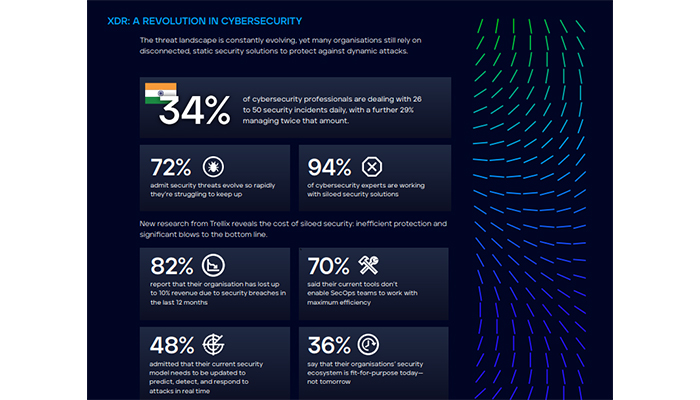Trelllix has released its global research report, which reveals the cost of siloed security, weak spots in protection and lack of confidence amongst security operations (SecOps) teams. The Trellix study involving 9,000 global cybersecurity professionals, including 1000 from India, also looks to the future of security, and the technology poised to revolutionize SecOps. Nearly 94% respondents described their current security model as “siloed.” Consequentially, almost three-quarters (73%) are likely allocating budget to advanced solutions, including XDR, to enable an integrated security approach.
“This research reveals how unsustainable the situation is for cybersecurity professionals today,” said Aparna Rayasam, chief product officer, Trellix. “Instead of relying on traditional solutions that add complexity, businesses can reshape security operations with a flexible, intelligent security platform designed to consolidate security tools and quickly remediate threats.”
Only 6% of Indian organizations are working with a fully integrated security model, with another 12% in the process of changing their siloed set-up. The research revealed 67% of cybersecurity professionals work with more than ten different security tools or solutions across their organization, with more than 20 tools for 4% of respondents.
Disconnected solutions are holding businesses back. Seven in ten (70%) cybersecurity professionals admit their current security tools don’t enable their SecOps team to work with maximum efficiency. Almost one third (29%) recognize they have blind spots in their protection today.
49% of cybersecurity professionals feel “very confident” in their organization’s ability to quickly adapt to new threats, while 72% admit security threats evolve so rapidly, they’re struggling to keep up.
On average, respondents’ organizations deal with 55 cybersecurity incidents each day, while over 42% admit they cope with 50 to 200 incidents daily. Over half (53%) report being “inundated by a never-ending stream of cyberattacks” as one of their biggest work frustrations. A fifth (20%) say they can never or ‘only rarely’ prioritize and respond quickly to threats.
82% estimate their organization lost up to 10% of revenue from security breaches in the last twelve months. Medium size businesses (with US$50-100m revenue) lost an average of 9% in revenue, compared to almost 6% for large businesses (with a turnover of US$10bn – US$25bn), representing revenue losses of between $600m and $1.5bn.
Venkat Krishnapur, Vice-President of Engineering and Managing Director, Trellix India said, “The majority of current security options rely on siloed intelligence. These may address immediate threats, but the increasing number and complexity of cyberattacks are forcing security teams into a noticeably constant reactive posture. Ergo, we are unknowingly creating security silos.
This is where extended detection and response (XDR) comes in. Trellix’s XDR ecosystem, integrates several security tasks, unifies telemetry from many sources, and uses Machine Learning and analytics to prioritize and swiftly respond to major threats. Not only does this help in improving SecOps efficiency, but also reduces risk through improved detection, response and remediation capabilities. This provides organizations the strongest defense against a constantly evolving threat security landscape.”
29% of cybersecurity professionals have already implemented XDR in their organization, with a further 48% very likely to do so in the next 12-18 months. Additional technologies very likely to be implemented are Security Orchestration, Automation, and Response (SOAR) (43%), Network Detection and Response (NDR) (43%), and Endpoint Detection and Response (EDR) (41%).
The study, based on research conducted by Coleman Parkes, surveyed 9,000 cybersecurity decision-makers from organizations, including 1000 from India, with 500 or more employees across fifteen markets: Australia, Brazil, Canada, Chile, Colombia, France, Germany, India, Indonesia, Mexico, Singapore, South Africa, UAE, the UK, and the USA.
Trellix is a global company redefining the future of cybersecurity and soulful work. The company’s open and native extended detection and response (XDR) platform helps organizations confronted by today’s most advanced threats gain confidence in the protection and resilience of their operations. Trellix, along with an extensive partner ecosystem, accelerates technology innovation through machine learning and automation to empower over 40,000 business and government customers with living security.


